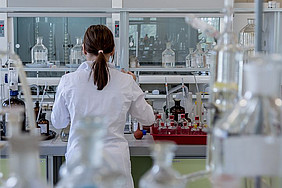Bavaria's young researchers are top in Germany: 16 of the 81 ERC Starting Grants 2022 for Germany go to young researchers in Erlangen, Munich and Regensburg. Science Minister Blume: "Great careers in science begin in Bavaria!" 9 ERC Starting Grants go to researchers working on topics in the life sciences.
With projects ranging from energy research to the fight against cancer, a total of 16 young scientists at Friedrich-Alexander-Universität Erlangen-Nürnberg (FAU), Ludwig-Maximilians-Universität München (2), Technische Universität München including Klinikum Rechts der Isar (12) and the University of Regensburg have acquired the prestigious ERC Starting Grants 2022 from the European Research Council (ERC).
A total of 408 researchers have received Starting Grants from the European Research Council (ERC) this year. The grants total EUR 636 million and are part of the Horizon Europe program. They are awarded to help excellent younger scientists who have 2 to 7 years of postdoctoral experience to start their own projects, form teams and pursue promising ideas.
ERC Starting Grants for Life Science Projects
9 of the 16 ERC Starting grants 2022 went to topics in the life sciences. At Friedrich Alexander University Erlangen-Nuremberg (FAU), Matthias Braun is researching "Health Simulations: Ethical and Societal Challenges of Digital Twins." Sarah Kim-Hellmuth of Ludwig-Maximilians-Universität München (LMU) aims to decipher the context-specificity of genetic immune regulation in plasmacytoid dendritic cells. Overcoming resistance to immunotherapy by immunostimulatory tumor-derived extracellular vesicles as multifunctional anticancer agents is the research of Simon Heidegger at the Klinikum rechts der Isar of the Technical University of Munich. Terrance John Hadlington, also TU Munich, is working on the project: "The Single-Centre Ambiphile ligand Concept: Cooperative Systems for Waste-free Catalysis." Colleague Julija Zavadlav is researching peptide-based design for supramolecular assemblies using multi-scale machine learning as a modeling approach, while Mathias Wilhelm is developing isoform fingerprints to discover the molecular diversity of life.
In the SYNSEMBL project, Henrike Niederholtmeyer aims to pioneer the synthesis, characterization, and activity research of biomolecular condensates, as well as pave the way for their application. Thorsten Kessler's team wants to analyze the molecular mechanisms in the extracellular matrix, the scaffold in which cells are arranged, in even greater detail and identify starting points for new drugs against cardiovascular diseases. In the MitoPIP project, Angelika Harbauer and her team will be investigating the functioning of mitochondria in nerve cells, or more precisely, the mechanisms and signaling pathways surrounding the protein synaptojanin, in order to better understand the processes of disease development and the mode of action of drugs.
Other funded projects from Bavaria
Ludwig-Maximilians-University Munich (LMU)
- STURKENBOOM, Ilse: Decorated Paper in the Early-Modern Islamicate World: Aesthetics, Techniques and Meaning in Global Contexts
Technical University Munich (TUM)
- PUTZ, Andreas: Recurring Elements of Modern Facades (1960-1990). Foundations for the Conservation of High-Tech Modernism
- SEIBOLD, Sebastian: Consequences of global biodiversity loss and climate change for decomposer communities and implications for forest carbon fluxes
- WUEPPER, David: A Global Evaluation of Public Policies to Mitigate and Reverse Land Degradation
- BHATOTIA, Pramod: A Decentralized Operating System
- EICHHORN, Johanna: Understanding Dynamic Processes at Nanoscale Working Interfaces for Solar Energy Conversion
University of Regensburg
- BARHAM, Joshua: Hybrid Electrochemically-paired Light Irradiated Organic Synthesis
Science Minister Markus Blume congratulated: "Great scientific careers begin in Bavaria: 13 ERC Starting Grants are nationwide tops! Our excellent universities are training top-class talents who are doing pioneering research: be it in the field of interfaces for solar energy conversion, on modeling approaches for machine learning, or contributing to research in the fight against cancer. Congratulations to all the award recipients and the successful universities!"
About the ERC Starting Grants
The ERC Starting Grants are prestigious grants of up to 1.5 million euros for outstanding research projects. It is awarded annually to scientists who are still at the beginning of their careers. The money is used, among other things, to set up an academic working group for the respective award-winning research project. Of this year's total of 408 winning projects from eligible countries, 81 are being led by researchers in Germany.

